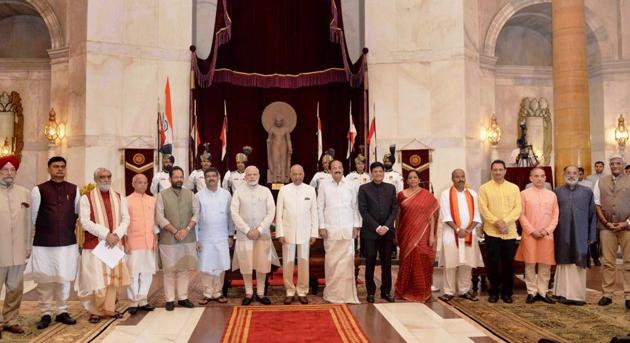Cabinet rejig: PM springs a few surprises; Nirmala gets defence, Goyal railways
Nirmala Sitharaman and Piyush Goyal emerged as two biggest gainers in the cabinet reshuffle. Another gainer in the latest round of restructuring was road transport and highways minister Nitin Gadkari.
Nirmala Sitharaman became the defence minister of the country, only the second woman after Indira Gandhi to hold the post since Independence, as Prime Minister Narendra Modi revamped his team on Sunday, inducting nine new members and changing major portfolios to bring dynamism and efficiency in governance.

Piyush Goyal became the railway minister, replacing Suresh Prabhu who had offered to resign after a spate of fatal train disasters. Prabhu replaced Sitharaman as minister of commerce and industry.
In probably the last major restructuring of his team before the 2019 general elections, Modi displayed innovation and boldness in picking new ministers and dropping half-a-dozen non-performers.
He inducted four former bureaucrats and gave three of them independent charge of ministries. Former diplomat Hardeep Puri was made housing and urban affairs minister, former home secretary RK Singh got power and new and renewable energy, and former DDA commissioner KJ Alphons will head tourism.
To reward performers, he promoted four ministers to cabinet rank — Sitharaman, Goyal, oil minister Dharmendra Pradhan and minority affairs minister Mukhtar Abbas Naqvi. He gave independent charge of ministries to three ministers of state — Rajyavardhan Singh Rathore, Santosh Gangwar and Giriraj Singh.
Textiles minister Smriti Irani retained the information and broadcasting portfolio that was given to her as additional charge after Venkaiah Naidu resigned before he was elected India’s vice president. The Prime Minister wielded the stick on non-performers, shifting water resources and Ganga rejuvenation minister Uma Bharti to the low-profile drinking water and sanitation ministry.
Road, transport and shipping minister Nitin Gadkari will now hold these portfolios.
New Delhi parliamentarian Vijay Goel was divested of the independent charge of sports and youth affairs.
Though Sunday’s exercise looked focused on bridging the gaps in governance and ensuring optimum performance by his council of ministers, it had a message to the constituencies the ruling BJP has been trying to woo. Sitharaman’s elevation is likely to go down well with women across the country and also in her home state, Tamil Nadu.
Similarly, promotion of Pradhan and induction of Alphons are likely to boost the BJP’s prospects in Odisha and Kerala.
But Modi didn’t seem to factor in political expediency as he refrained from inducting anybody from poll-bound Gujarat and Himachal Pradesh.
Modi’s council ballooned to 76 after the rejig, including 27 of cabinet rank and 11 ministers of state with independent charge. The previous reshuffle and expansion was in July last year.
The Prime Minister can induct six more ministers, an option he might exercise later to accommodate the JD(U) and other NDA constituents. The JD(U) was set to join the Union government on Sunday, but was put on hold because of the Shiv Sena’s demand for another ministerial berth and continuing internal bickering in the AIADMK, the ruling party in Tamil Nadu.
With two new ministers of state for parliamentary affairs — necessitated by Naqvi’s elevation to cabinet rank and change of SS Ahluwalia’s portfolio — the government is expected to revisit its parliamentary strategy to push its legislative agenda, which was often stalled by the opposition parties in the Rajya Sabha where the NDA is in a minority.
Ahluwalia has been shifted from parliamentary affairs to drinking water and sanitation under Bharti.
“I congratulate all those who have taken oath today. Their experience & wisdom will add immense value to the Council of Ministers,” Modi tweeted shortly after the swearing-in at Rashtrapati Bhawan. He also congratulated his four new cabinet ministers.
The President accepted the resignations of six ministers — Kalraj Mishra, Bandaru Dattatreya, Rajiv Pratap Rudy, Sanjeev Balyan, Faggan Singh Kulaste and Mahendra Nath Pandey.





